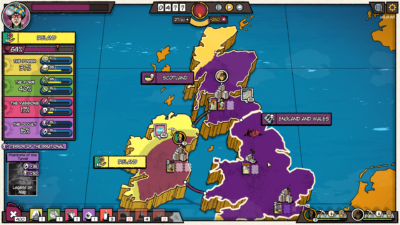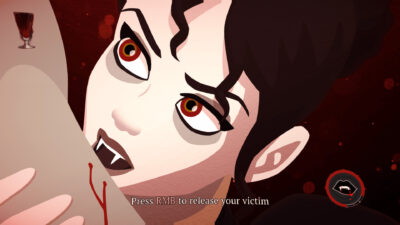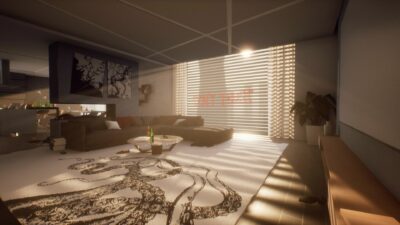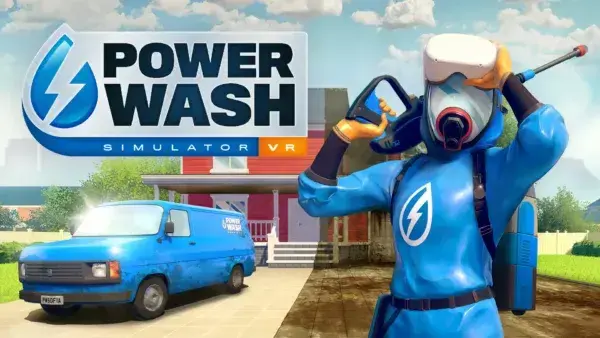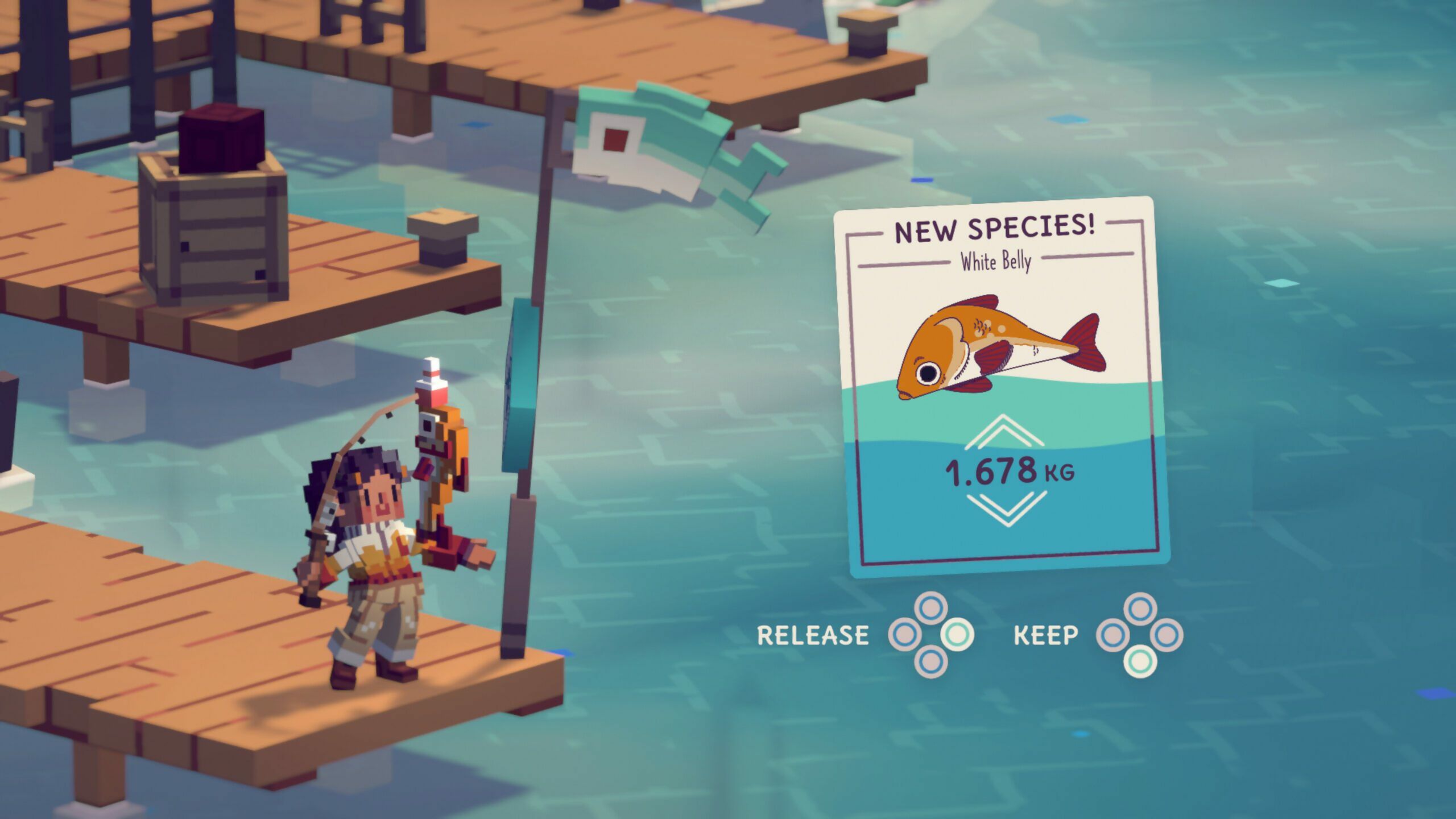
Personal experiences can influence game design in all kinds of ways. Way back in the 1980s, designer Katsuya Eguchi began thinking about the sense of detachment he felt when he first moved from his home town just outside Tokyo to begin working at Nintendo’s offices in Kyoto. Eguchi wondered how a video game could capture the feeling of starting a new life far away from family and friends. It was the seed that eventually gave the world Animal Crossing.
Moonglow Bay, Bunnyhug Games’ charmingly laid-back fishing RPG, has a markedly similar origin story. In 2016, studio co-founders Zach Soares and Lu Nascimento moved from Canada to the UK, and found themselves in a situation much like Eguchi’s all those years earlier. “Suddenly, we had no family, we had no friends,” Nascimento recalls. “And we were trying to build a sense of having a family and a support system around ourselves.”
“There’s no one to talk to,” Soares adds. “But we have dogs, so we built a community through our dog walks and stuff.”
Nascimento and Soares have a lively and endearing way of exchanging sentences, like a verbal pair of tag-team wrestlers. This means a typical conversation will go something like this:
“So we’re in the UK and making friends with the people that we would never imagine ourselves making friends with, just because we happen to walk the same place every day – we felt it was so important to have those people in our lives,” Nascimento says, breathlessly, to which Soares adds, “Yeah, so there’s characters in the game that will feel like that to you. You don’t expect to ever talk to this person on a daily basis…”
“… but you’ll end up getting to learn these very interesting, unexpected stories,” Nascimento continues. “And I guess it also coincided with Covid?”
“That was just a coincidence,” Soares points out. “We didn’t want to make the story so dark that you feel like you have a heavy heart after playing it or anything. But we wanted to have the reality of what it is to go through a hard time, and then having people around you to kind of lift you out of that.”

Moonglow Bay was born from Soares’ love of fishing games, and also Nascimento’s love of “non-violent, relaxing games” – “Other games make me really anxious,” she says.
Although Moonglow Bay is the product of an eight-strong team of developers, Nascimento and Soares’ personalities and interests are all over their gentle fishing RPG. Soares is a veteran voxel artist with ten years of industry experience; he’s from Eastern Canada, a similar area to where the game is set. Nascimento is an art director (you’ll find Wargroove and Assemble With Care among her credits) who felt that her Brazilian heritage was under-represented in video games; as a result, two of the playable characters you can select in Moonglow Bay are indigenous Canadians. “I kept thinking, ‘Who else isn’t seeing themselves in games at all?’ And so, the whole representation thing was really important, especially for older people,” Nascimento tells us.
“Eastern Canada is where a lot of Native Canadians are, and a lot of them are actually fishermen,” Soares continues. “So two of the four characters you can choose from have Native Canadian heritage.”
Set in the titular – and fictional – fishing town, Moonglow Bay takes place in the late 1980s, a time before people could readily form virtual communities online. Its heartfelt backstory also has a personal significance to its creators: you take on the role of a middle-aged, recently bereaved Moonglow Bay resident, and take up fishing as a means of processing your grief. “It’s directly inspired by my father’s best friend who lost his partner in middle age,” Soares tells us. “He didn’t know what to do. He kind of wanted to figure out his own community and get in touch with everyone around him. He’d been with this person since he was a teenager, and it was, like, his one and only love. How do you deal with that? You don’t just go back to the dating scene; you kind of want to, instead, stay in touch with the people around you. That was our route to the motivation in the game – we’re not going to do a dating aspect of the game, because we want to focus on building friendships.”

Cooking isn’t the central focus of Moonglow Bay, but it’s still a fun and worthwhile diversion, with a number of mini-games and around 50 recipes you can discover and master as you progress.
Beyond the story of your chosen character, there’s the wider populace of the bay, whose little town has grown tired and dilapidated. But through completing fishing quests, you can gradually breathe life back into this huddled community – and at the same time, make new friends.
“We wanted to build these relationships that feel meaningful and natural,” Soares says. “We didn’t want to force it, either. So there’s a main line story that you go through, and you make friends through that. And that’s the bare minimum of friends you can build, which is going to feel totally natural in your day-to-day life. There’s always going to be those two or three friends you make, but then you can go the extra mile and be friends with ten other people. And then you’re like, ‘OK, this is what it means to build this community’.”
Moonglow Bay began life four years ago as a pitch to publisher Coatsink; although the game was conceived as a relaxing fishing RPG from the beginning, its creators spent a considerable amount of time iterating on the idea. “The biggest challenge was being confident that the base mechanic was going to carry the game forward,” Soares says. “You get this fear that it’s not enough.”

Bunnyhug strike a sold balance between variety and pick-up-and-play simplicity when it comes to the fishing mechanics.
Bunnyhug spent around 18 months in pre-production, prototyping different ideas and adding extra systems until they – ironically – realised that their earlier, simpler concept was the best one. “The conclusion we all arrived at was, ‘Oh yeah, the initial idea’,” Nascimento recalls. “We were going back to exactly that.”
“You can imagine my frustration when our solution was to go back to square one,” Soares says, with a rueful laugh. “You say, ‘Oh, geez’.”
The advantage of that pre-production phase, perhaps, was that it revealed just how well a ‘less is more’ approach could work when it came to Moonglow Bay’s fishing: there’s a decent selection of rods and lures, as well as different kinds of fishing – net fishing, line fishing, ice fishing, and so forth – but the system’s uncluttered and approachable rather than offering the fiddly mechanics you’d find in a hardcore sim. “We didn’t want to make a complex game of numbers and matching too many things,” Nascimento says. “We wanted it to be easy to pick up.”
“Which is why you’ll find a lot of really interesting design choices in a lot of things we do,” Soares continues. “We could have expanded to ten variables with the fishing rods, for example, but we left it at three rods. It could have been so many more, but that adds so much weight (to development).”
“Yeah,” Nascimento agrees, “we’d have to check every single one and balance the fish to its…”
“…so it’s very much like a simplification of design, but also adding a lot of depth to that simplification,” Soares adds, “so that’s a hard balance.”
“It’s a very hard balance,” Nascimento continues, “but it feels like every single little choice has a lot of impact because you have so, so, few tools that you can use as a resource.”

Moonglow Bay’s music is by Lena Raine, who previously provided the score for Celeste.
Moonglow Bay’s clean voxel art style – not to mention Nascimento’s gorgeous character and UI designs – are also in keeping with the game’s subtle approach. “I’ve been doing voxel art for almost ten years, and I feel there’s a simplification to it,” Soares says. “You can obviously get really complex by rendering things out to an almost realistic degree. But with the simplification that I apply to it, using Lu’s palettes and her designs, I feel like there’s a lot of opportunity to clearly communicate things to players. I can just put a little bit of extra detail on an object, and immediately, players will know ‘Oh, that’s an important thing’.”
“I think it gives the player the feeling we used to get from pixel art games on a CRT television,” Nascimento adds. “It leaves things open for interpretation.”
As we spoke to Nascimento and Soares in August 2021, it was almost four years to the day since they signed up to make Moonglow Bay. Since the game got going in 2017, they and their team have plugged away through the modern joys of remote working (“It spans the globe, so when one person’s awake, someone else is asleep…”) to the small matter of shepherding a project in the midst of a pandemic. But with Moonglow Bay now available for the world to sample, its creators remain as refreshingly effervescent and upbeat as the game they’ve worked so hard to build.
“When we move to a neighbourhood, we like to make sure that everyone has what they need,” Nascimento enthuses, returning to one of Moonglow Bay’s dominant themes. “Yeah, we help our neighbours and stuff like that,” Soares nods. “I think it’s good to be connected to your community… And that’s why the community aspect matters in the game – your growth is in line with theirs. It’s like, when you’re suffering, other people are suffering with you. You’re not alone with yourself and your pain.”
Moonglow Bay is available now for PC and Xbox One.


